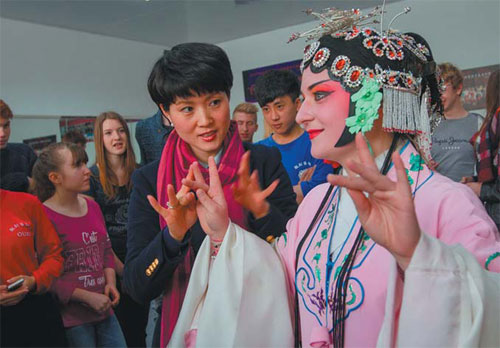Early age exchanges encouraged
Teenagers urged to discover new cultures and go beyond stereotypes
Editor's note: Both China and Germany have a long tradition of high-quality education and they hope to promote people-to-people communication and exchanges, especially among young teenagers. At a government consultation meeting in October last year, headed by Premier Li Keqiang and German Chancellor Angela Merkel, both sides agreed to take measures to promote exchanges among pupils and students and to work on establishing a long-term exchange mechanism to enrich bilateral exchanges. Michael Clauss, Germany's ambassador to China, shares his opinions on cultural and educational exchanges between Chinese and German teenagers.
What are your impressions of Chinese and German teenagers?
I have four children myself. We have been living in Beijing for two years now and they have made many Chinese friends. My eldest even has a Chinese girlfriend and one thing they all have in common is their passion for their smartphones and online games.
There is no difference between German and Chinese teenagers in this respect. My impression is that German teenagers in general tend to be quite carefree: They do sports, play music and try to find their own way in life. We try to give them some leeway to develop their own ideas. That is, of course, as long as they do their homework and their part in the household. Chinese teenagers seem to be of a slightly different sort: They are more focused on school and have less spare time. Their self-discipline is impressive.
I personally think that self-determination and self-discipline don't conflict. That is why I think that Chinese and German teenagers can learn a lot from each other.
What can the two countries learn from each other in terms of educational development?
Education has a long tradition in Germany and in China. Just look at the teachings of the old Chinese masters or the foundation of the first German universities in the Middle Ages.
Today, we are both leading industrial and export nations. Our economies need highly skilled workers and creative thinkers. High-quality education is our most valuable resource.
Germany and China alike attach great importance to the development of their educational systems. But our methods and goals are slightly different. For us, creativity and the ability to solve problems independently are the ultimate goals. There are a few drawbacks to this. For example we tend to neglect knowledge transfer, an aspect of education China has traditionally emphasized. Just look at the high rankings Chinese students achieve in international education studies.
Fostering knowledge and creativity should not be a contradiction. That's why I think that China and Germany should learn from each other in educational development.
Could you talk about current and future communications among the young generations across the world?
When I was in school we were encouraged to find pen pals from France or England. We should regularly write letters to improve our language skills and get to know foreign cultures.
Today we live in a digitalized world. Whereas my letters traveled for days, our children communicate with their friends all over the world in the blink of an eye. While they communicate easily across borders, they still need a common language. Learning languages has become even more important in this digitalized global community.
But if you really want to get to know another country, its culture and lifestyle, you eventually have to go there and meet people. Nothing is more valuable than a face-to-face encounter with teenagers from another country. That's why we want to promote exchanges between China and Germany.
What benefits do you see in fostering exchanges between the people, especially teenagers, from the two countries?
I sometimes take a taxi in Beijing. After telling the driver where I come from he will always tell me what he knows about Germany: beer, cars and football. Of course, this is not wrong, but it is only a small part of German reality.
On the other side, most Germans have lost track of China's breathtaking development. Coming to China they are overwhelmed by the economic, political and social change they see. Many expect to see only bicycles in the streets and are taken aback by the traffic jams in Beijing. They cannot imagine what Chinese reality is like and sometimes make false or premature judgments. That is why I think that exchange is a necessity.
We have to grasp the rapid changes going on in the world today. Otherwise our thinking will remain dominated by stereotypes and misunderstandings will remain. We should start to foster exchanges at an early age.
My hope is that many Chinese and German teenagers will seize the chance to discover the dazzling variety of our cultures far beyond stereotypes.

|
Middle school students from Germany on an exchange program at Wenzhou Foreign Language School learn a local drama from their peers at an opera class in Wenzhou University, Zhejiang province, in April. Zhao Yong / for China Daily |
(China Daily 07/24/2015 page12)















